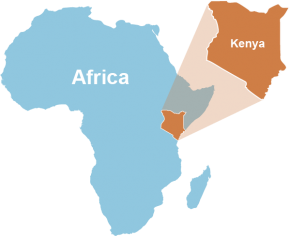Kenya is geographically located in the East Africa. It as about 74 ethno-cultures. It gained independence from Britain in 1963. Kenya has over the years experience severe political and economic difficulties. Kenya begun as a multiparty system in 1963. However, multiparty system ceased to exist around 1969. Kenya effectively became a single party state. Severe political repression begun from 1969 and included political assassinations, detentions without trial, muzzling of the parliament, press, civil society and the general population. Freedom of expression and criticism were totally curtailed. Critics were hauled into detentions with severe torture.
 In 1992, Kenyans secured a return to multiparty system. Local activists supported by donors compelled the government to reintroduce political pluralism. However, it came with a very high price. Hundreds were jailed or thrown into detentions. These were tortured or killed. Subsequently, the struggle for political space was turned into ethnic contest leading to horrific ethnic/political violence.
In 1992, Kenyans secured a return to multiparty system. Local activists supported by donors compelled the government to reintroduce political pluralism. However, it came with a very high price. Hundreds were jailed or thrown into detentions. These were tortured or killed. Subsequently, the struggle for political space was turned into ethnic contest leading to horrific ethnic/political violence.
Since 1992, ethnic cleansing has been occurring with greater severity. But ethnic animosity had been building up since the assassination of Tom Mboya in 1969. Over the years, close to over 10,000 politically and ethnic targeted massacres has occurred (this may be much higher than this). Over 3million people have been uprooted from their homes in what may be described as ethnic cleansing. A more devastating ethnic war if not a very confused civil war (similar to the current DRC fighting) may be waiting Kenyans not too far in the future. It may take the form of different tribes fighting in different fronts simultaneously. This is because more tribes have developed more dislike of each other and as such the level of suspicion and mistrust between all ethnic groups is much higher than in the 1980s, 1990s and 2000s- and its worse. Such complex fighting has been going between the Pokot, Turkana, Samburu and Baringo communities. Each of these communities may be facing hostilities from several of them at a more same time. Unfortunately the current and past governments have done virtually little to address this simmering ethnic hatred. Thus the causes of past ethnic violence remains intact as much as new causes of inter-communal violence have come on board.
The Good Governance Team-Kenya has put in place measures that address these deep seated dissatisfaction and annoyance that many ethnic, clans, and religious groups harbour against each other. These measures are in diverse areas: economic justice, political inequality, community equality, ethnic favouritism issues, historical injustices, etc
Kenya extreme poverty levels are high. About 50% of Kenyans live below the poverty. Generally speaking about 83% of Kenyan are poor. The unemployment is high across all ages. Its high especially among the youth- as high as 70% or 10million. Much of the unemployment is due to corruption and extravagance within the political elite class. Corruption in Kenya costs more than 2 million jobs per year. The GGT-Kenya is determined to eliminate both corruption and unemployment by creating 2million jobs per year. It is also focused to make Kenya the latest Newly Industrialized Country (NIC) by creating 700 factories within 5 years.
